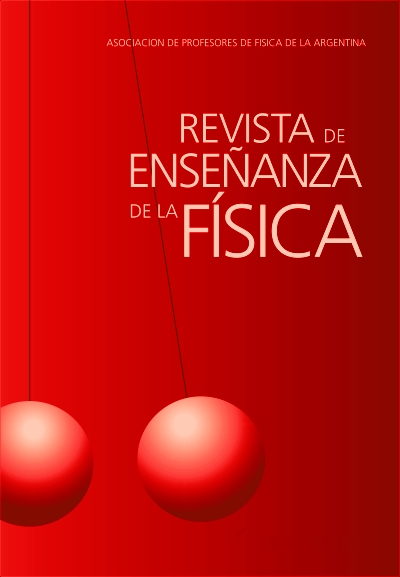The indicators of problematization and contextualization processes in a physics class
DOI:
https://doi.org/10.55767/2451.6007.v35.n1.41396Keywords:
Problematization, Contextualization, Teaching physics through investigation, Science club, IndicatorsAbstract
This work aims to characterize the indicative elements of the contextualization and problematization processes in a class on the Laws of Inertia and Action and Reaction at the Science Club of UFPA, which is an informal internship space. Through the planning of the class, the report of its development, carried out with students from the 6th and 7th year of elementary school and from the written records of these students, elements that were present in pedagogical situations were identified that allowed characterizing the processes of problematization and contextualization during the application of a class in which the strategy of teaching science by research was used. It was observed that the behavior and dialogues of the students in the classroom presented contradictory arguments in the face of the proposed research situation. The relationships between the object of investigation and everyday situations were also used as indicators. Thus, from the initial problematization made by the teachers, the process of contextualization by the students was reached. We note the importance of the contribution of interventions to the teaching-learning process, during the mediations of the pedagogical processes, were more significant for encouraging and leading the student’s participation, and that knowledge is needed that goes beyond the content to be taught for the development of a contextualized teaching and the formation of the student as citizen and as a propagating agent of knowledge and information in accordance with the objectives of the National Curriculum Parameter (PCN) for elementary education Brazilian.
References
Arruda, R. S. (2022) BNCC e ensino de física: a incógnita do ensino interdisciplinar. Universidade Estadual Paulista (Unesp). Recuperado de: <http://hdl.handle.net/11449/216995>.
Carvalho, A. M. P. (Org.) (2013). Ensino de Ciências por Investigação. (1a Ed.) São Paulo, Brasil: Cengage Learning.
Carvalho, A. M. P. (2016). O Ensino de Ciências e a proposição de Sequências de Ensino Investigativas. In: A. M. P. Carvalho, Ensino de ciências por investigação: condições para implementação em sala de aula (01-20). São Paulo, Brasil: Cengage Learning.
Piaget, J. (1976) Psicologia e Pedagogia. Rio de Janeiro, Brasil: Forense Universitária.
Ricardo, E. C. (2010) Problematização e Contextualização no Ensino de Física. In: Carvalho, A. M. P. (Org.). Ensino de Física (Coleção Ideias em Ação) (29-51) (1.a ed.). São Paulo, Brasil: Cengage Learning.
Vygotsky, L. S. (1984) A formação social da mente. São Paulo, Brasil: Martins Fontes.
Zômpero, A. F., Laburú, C. E. (2011) Atividades investigativas no ensino de ciências: aspectos históricos e diferentes abordagens. Ensaio: Pesquisa em Educação em Ciências (67-80).
Downloads
Published
Issue
Section
License

This work is licensed under a Creative Commons Attribution-NonCommercial-NoDerivatives 4.0 International License.
Aquellos autores/as que tengan publicaciones con esta revista, aceptan los términos siguientes:Los autores/as conservarán sus derechos de copiar y redistribuir el material, bajo los términos estipulados en la Licencia de reconocimiento, no comercial, sin obras derivadas de Creative Commons que permite a terceros compartir la obra bajo las siguientes condiciones:
- Reconocimiento — Debe reconocer adecuadamente la autoría, proporcionar un enlace a la licencia e indicar si se han realizado cambios. Puede hacerlo de cualquier manera razonable, pero no de una manera que sugiera que tiene el apoyo del licenciador o lo recibe por el uso que hace.
- NoComercial — No puede utilizar el material para una finalidad comercial.
- SinObraDerivada — Si remezcla, transforma o crea a partir del material, no puede difundir el material modificado.
- Los autores/as podrán adoptar otros acuerdos de licencia no exclusiva de distribución de la versión de la obra publicada (p. ej.: depositarla en un archivo telemático institucional o publicarla en un volumen monográfico) siempre que se indique la publicación inicial en esta revista.
- Se permite y recomienda a los autores/as difundir su obra a través de Internet (p. ej.: en archivos telemáticos institucionales o en su página web) antes y durante el proceso de envío, lo cual puede producir intercambios interesantes y aumentar las citas de la obra publicada. (Véase El efecto del acceso abierto).










